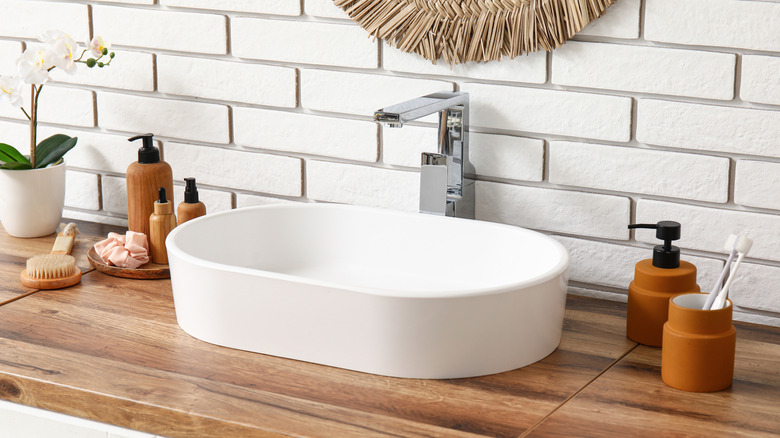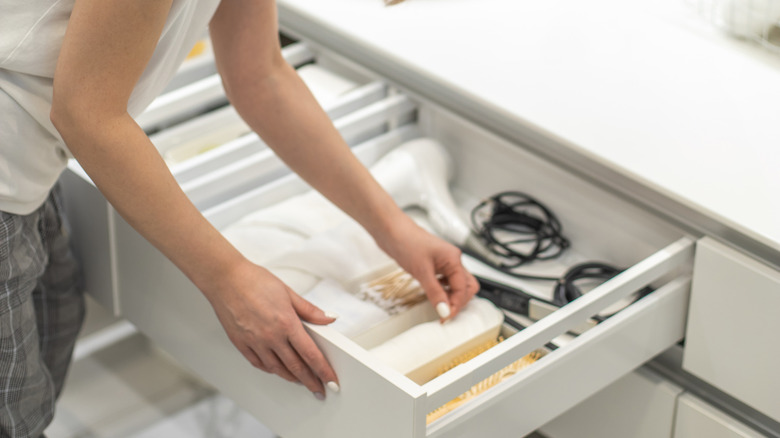Why You Should Rethink Decanting Your Bathroom Products To Declutter
Bathrooms as we know them are a relatively modern innovation, becoming a middle-class American standard in the late 1800s. But one element of bathrooms that hasn't changed much, is that there never seems to be enough storage for all the body care, beauty products, cleaning supplies, medicine, and more that fills your daily routine. That subjects homeowners to an interesting push and pull between keeping necessary countertop products in-reach, and wanting a clean, minimalist space. One solution that's been popping up on social media sites like Instagram is to decant your bathroom products; moving soaps and other liquids into clear or otherwise unmarked containers to standardize bottle and remove excessive brand labels. It's a smart tweak that helps your bathroom feel like a resort, however, even if you're careful to keep track of which product goes where, this can have unforeseen consequences on the materials themselves.
On first blush, your concern about decanting bathroom products might be the potential for using one product when you meant to grab another. In the early morning hours, there's no guarantee you won't grab a chemical skin irritant in place of your sensitive skin moisturizer, or worse, something with long-term health consequences (no matter how you label the near-identical decanter bottles). However, a less-considered concern is that certain products might react poorly to new container compositions.
The unforeseen consequences of decanting your bathroom products
Some bathroom products are going to be easier to declutter by decanting. For example, liquid hand soap dispensers are a common way to add to your bathroom's aesthetic; you can even DIY your own soap dispensers with thrifted vases. However, you'll want to be careful about skin care creams or sunscreen. For one thing, these substances will undoubtedly look similar outside of their branded packaging, which as mentioned could lead to mix-ups. But the chemical composition of these products might also be affected by decanting. Cosmetics and personal care products are particularly susceptible to outside contaminants, and this includes microplastics that might shed off certain containers before being rubbed into your skin. Also, products are in specific packaging for a reason. Some need opaque or dark bottles to block light, while others need to stay in an air-tight container to maintain freshness.
Another problem with decanting bathroom products is that their safety labels and expiration dates are important to have on-hand. Take medications – labels on pill bottles will include a bevy of information such as the drugs' active ingredients, warnings about when not to take it, contacts for Poison Control, and more. Skin creams and other cosmetics carry similar information under FDA product codes. If you have a volatile reaction, your ability to respond might be hampered if every label is tucked away in a drawer or thrown out in favor of decanted glass bottles.
Ways to declutter your bathroom products without the risks of decanting
Decanting your bathroom products into nondescript containers may create a more elegant, clean look for your bathroom, but there are other solutions if you want to avoid ruining their performance. Most notably, you can cull any products you aren't regularly using, leaving more room in your drawers or cabinets to hold the important bottles and creams out of sight. If those products are so regularly in rotation that you don't want to keep pulling them in and out of drawers, you can always DIY a unique bathroom clutter organizer using objects from Dollar Tree or other discount stores. Having your bottles organized on something like a segmented lazy susan should make you feel better than having them scattered haphazardly across the countertop.
You also don't have to abandon your interest in decanting entirely. This can be a fun way to match the aesthetic of your bathroom using lower-stakes products such as hand soap and shampoo. It's even a necessity if you travel often. Federal airline regulations still restrict the amount of any liquid, cream, or gel you can carry onto a plane, making it sometimes necessary to decant a small portion of your favorite products into smaller containers. Even so, it's important to remain vigilant of any unforeseen chemical reactions and take note of specific safety precautions from the manufacturer.


